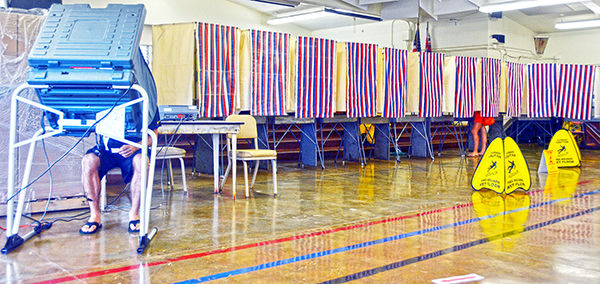LIHUE — Some believe the hot-button issue of genetically modified crops and pesticide use played a role in Saturday’s primary election results, while others say apparent trends in the voting have more to do with where candidates call home. Take
LIHUE — Some believe the hot-button issue of genetically modified crops and pesticide use played a role in Saturday’s primary election results, while others say apparent trends in the voting have more to do with where candidates call home.
Take the race for mayor. Incumbent Bernard Carvalho Jr. dominated the primary, winning 14 of 16 precincts and snagging 57.6 percent of the vote.
His highest profile challenger, North Shore resident Dustin Barca, was able to win on home turf; however, support elsewhere on the island was relatively sparse — especially on the agricultural Westside.
Barca, a vocal opponent of the agrochemical industry and its pesticide use, won only two precincts (when including early and absentee voting) — his hometown of Kilauea and nearby Hanalei, where he took 66 and 63 percent of the votes, respectively.
He received 30 percent of the overall vote, with one-fourth of it coming from the Kilauea and Hanalei precincts.
Everything from Anahola to Kekaha, as well as the island of Niihau, belonged to the incumbent mayor, who drew fire in October when he vetoed Bill 2491 (now Ordinance 960) — a county law regulating GMOS and pesticide use.
Carvalho’s largest wins were on the island’s Westside, where he took 66 percent of the vote at the Waimea precinct and 71 percent in Kekaha.
Barca said he has no doubt that the GMO/pesticide issue is playing a huge part in the election, and that there is a push on the Westside to keep him from being elected.
“Everybody thinks if Dustin Barca becomes mayor everyone’s going to lose their jobs,” he said. “(But) I can’t just make the companies leave.”
In the Kauai County Council race, supporters of Bill 2491 dominated the North Shore, while opponents to the law were heavy favorites on the Westside.
In Hanalei and Kilauea precincts, candidate Felicia Cowden, a supporter of the law, tallied the highest number of votes with nearly 10 percent. Also among the top finishers there were incumbent councilmen Gary Hooser and Tim Bynum, who co-sponsored the bill.
Cowden, a resident of Kilauea, said the community there knows her, and that her support is about more than her stance on 2491. However, she said there is no doubt that the issue brought people to the polls.
“In my campaigning, in every region, particularly the Westside, the pesticide concern was the No. 1 element that I was asked about,” she said.
Hooser voiced a similar opinion, saying candidates always do best where they are known and seen.
“Single issues are clearly important, there’s no questions about it,” he said. “But most important is the candidates and how they relate to people in the community, and how hard they work.”
While he believes GMOs and pesticides are an important issue on Kauai, Hooser said it is not the overriding one.
“I think it’s a bunch of issues. Certainly the property tax issue is on people’s minds,” he said.
In the Westside precincts of Kekaha, Waimea and Hanapepe, incumbents Mel Rapozo and Ross Kagawa — the only two council members who voted against 2491 — finished at the top. They also took the No. 1 and 2 spots overall.
Rapozo said numbers can’t be ignored and that he believes Saturday’s outcome clearly shows there was a vocal minority — many from the North Shore — as well as a silent majority, that did not come out to testify during Bill 2491 hearings.
“I always felt that the general public, the majority of people, was opposed to 2491,” he said. “Whether that had a play in the election is very hard to say.”
Kagawa agreed, but said he would like to think he and Rapozo benefitted from their vote against the bill.
“I really believe putting the taxpayers on the hook when we know there are problems is not responsible,” he said, referring to the lawsuit that has been filed by the seed companies against the county to block implementation of the law.
Rounding out the top four candidates in the Waimea and Kekaha precincts were Arthur Brun, a Waimea resident and Syngenta employee, and Grove Farm employee Arryl Kaneshiro of Koloa.
While he isn’t sure how much, Brun said he believes 2491 affected voting around the island, as well as the issues surrounding real property taxes. Those two issues are why Brun believes Rapozo and Kagawa finished No. 1 and No. 2 in the primary.
“(They’re) the only ones that stood up for the people,” Brun said.
•••
Chris D’Angelo, environment writer, can be reached at 245-0441 or cdangelo@thegardenisland.com.


